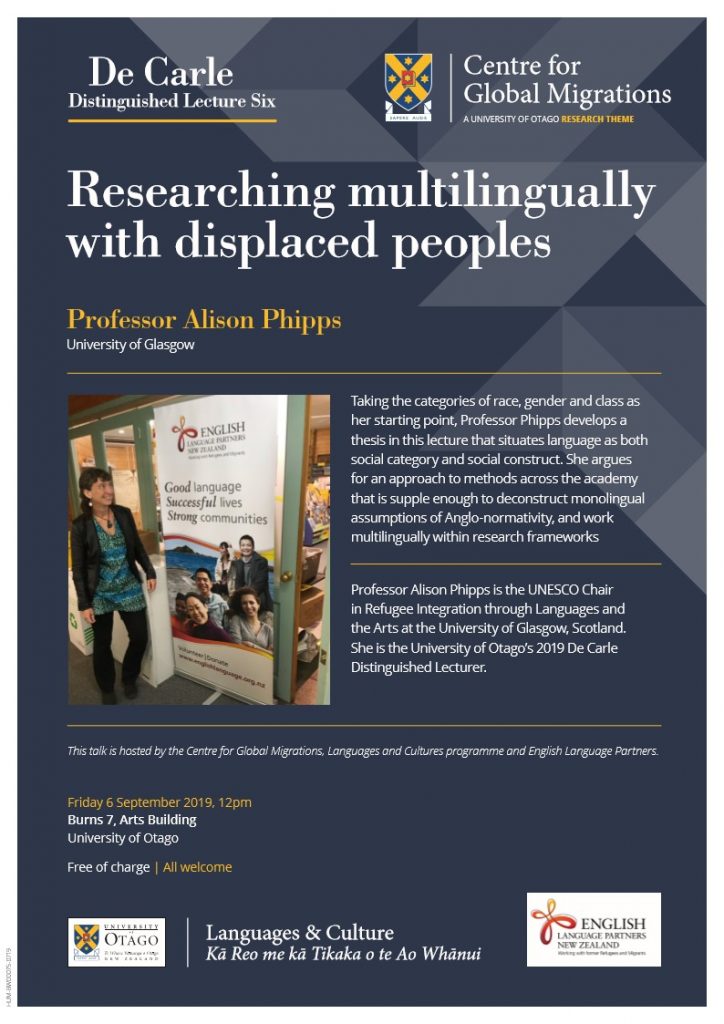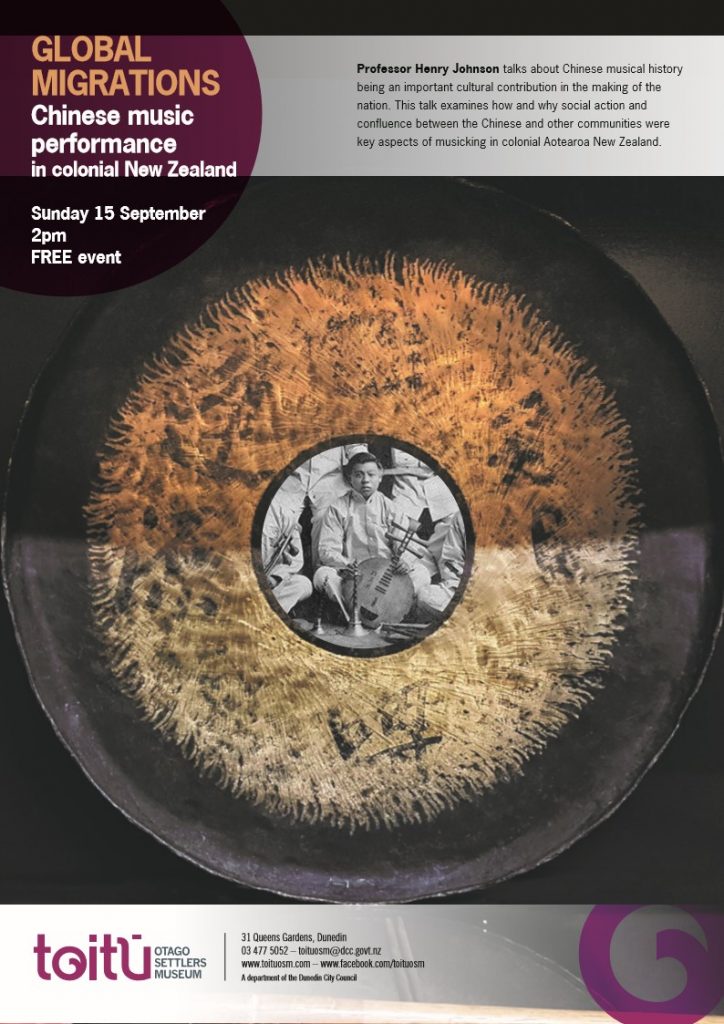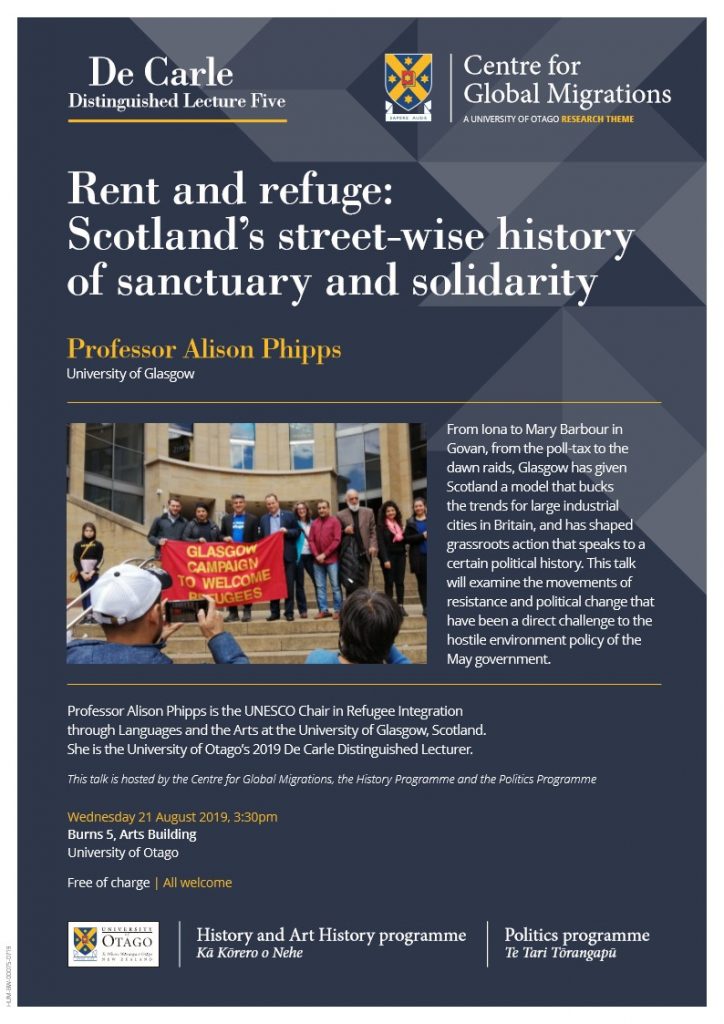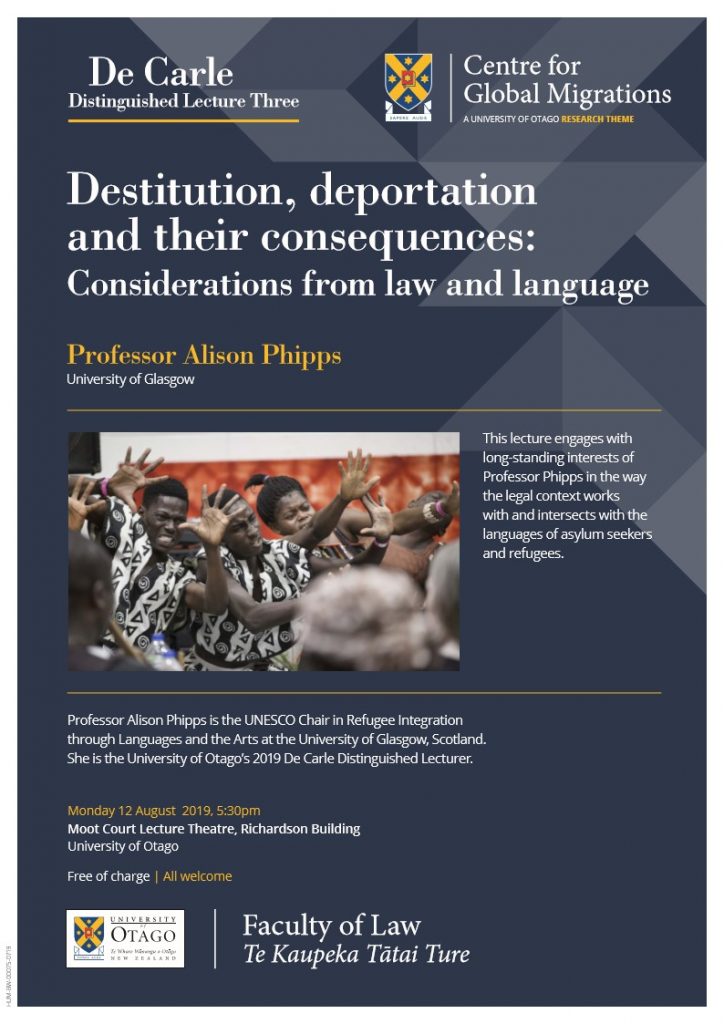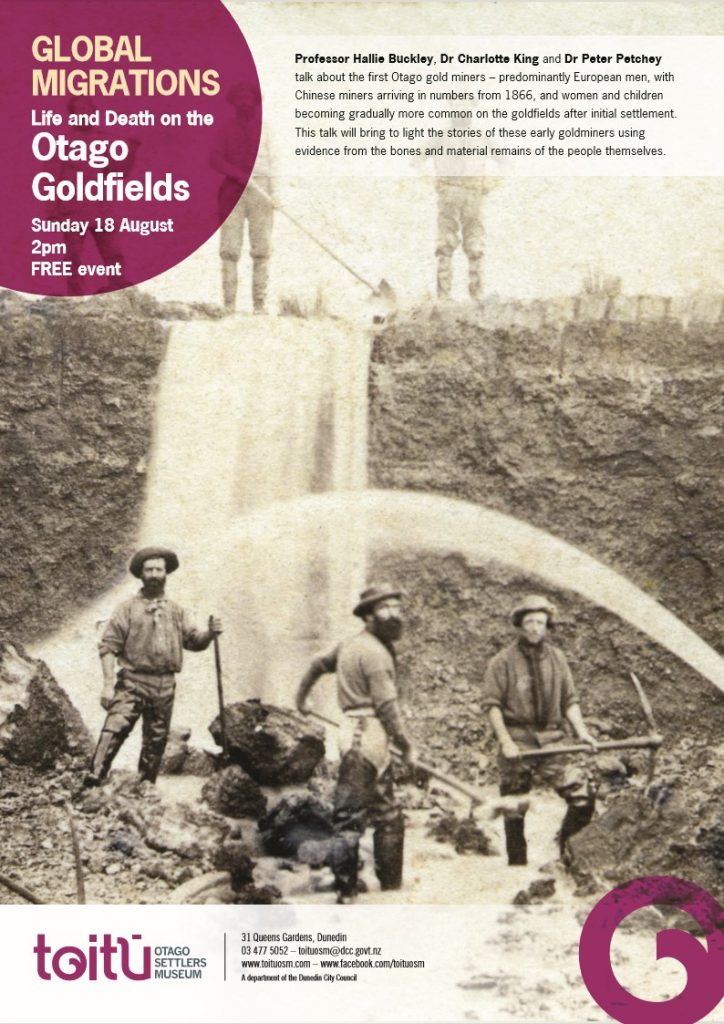2019 De Carle Lecture Series: Talk Six
Free Public Lecture
‘Researching multilingually with displaced peoples’
Professor Alison Phipps
University of Glasgow
Friday 6 September 2019, 12.00pm
Burns 7 Lecture Theatre, Arts Building, Albany Street, University of Otago
Please join us for the sixth talk of the 2019 De Carle Distinguished Lecture Series, co-hosted with the Languages and Cultures Programme and English Language Partners.
Taking the categories of race, gender and class as her starting point, Professor Phipps develops a thesis in this lecture which situates language as both social category and social construct, arguing for an approach to methods across the academy which is supple enough to deconstruct monolingual assumptions of Anglo-normativity and work multilingually within research frameworks.
Global Migrations 2019 Public Lecture Series Talk 3: Chinese music performance in colonial New Zealand
Free Public Lecture
‘Chinese music performance in colonial New Zealand’
Professor HENRY JOHNSON
University of Otago
Sunday 15 September 2019, 2pm
Toitū Otago Settlers Museum
Please join us for the third talk in our 2019 Global Migrations Public Lecture Series when our member Professor Henry Johnson discusses Chinese music performance in colonial New Zealand.
New Zealand’s Chinese musical history is an important cultural contribution in the making of the nation. This talk examines how and why social action and confluence between the Chinese and other communities were key aspects of musicking in colonial Aotearoa New Zealand.
2019 De Carle Lecture Series: Talk Five
Free Public Lecture
‘Rent and refuge: Scotland’s street-wise history of sanctuary and solidarity’
Professor Alison Phipps
University of Glasgow
Wednesday 21 August 2019, 3.30pm
Burns 5 Lecture Theatre, Arts/Burns Building, Albany Street, University of Otago
Please join us for the fifth talk of the 2019 De Carle Distinguished Lecture Series, co-hosted with the History and Art History Programme and Politics Programme.
From Iona to Mary Barbour in Govan, from the poll-tax to the dawn raids, Glasgow has given Scotland a model which bucks the trends for large industrial cities in Britain, and has shaped grassroots action which speak to a certain political history. This talk will examine the movements of resistance and political change that have been a direct challenge to the hostile environment policy of the May government.
2019 De Carle Lecture Series: Talk Four
Free Public Lecture
‘Refugee integration and the arts of hospitality’
Professor Alison Phipps
University of Glasgow
Tuesday 13 August 2019, 7.30pm
Mornington Methodist Church, Corner of Galloway and Whitby Streets, Mornington, Dunedin
Please join us for the fourth talk of the 2019 De Carle Distinguished Lecture Series, co-hosted with Mornington Methodist Church and the Dunedin Interfaith Council.
This talk will reflect on the role played by faith communities in the welcome of refugees to Europe, and especially to Scotland over the past 10 years. It will share stories from individual countries but also from the City of Glasgow, known for its campaigning offer of hospitality and protection, and from personal hosting. It will also consider the reluctance of congregations and communities to act until a point of crisis had been reached and the compatibility of faith-based teachings, prayer and obedience to teachings with the practical realities of societies in the grip of fear. Using poetry, liturgy and story the talk will take the form of a journey out into the public square and back into the recesses of the spirit.
2019 De Carle Lecture Series: Talk Three
Free Public Lecture
‘Destitution, Deportation and their consequences: Considerations from Law and Language’
Professor Alison Phipps
University of Glasgow
Monday 12 August 2019, 5.30pm
Moot Court, Richardson Building, University of Otago
Please join us for the third talk of the 2019 De Carle Distinguished Lecture Series, co-hosted with the Faculty of Law.
This lecture engages with long standing interests of Professor Phipps in the way the legal context works with and intersects with the languages of asylum seekers and refugees.
Migration, Health and Wellbeing draft conference programme
We are delighted to publicise the draft Programme 1 Aug 2019 (PDF, 254KB) for our Migration, Health and Wellbeing conference taking place in November 2019. Our keynote speakers – Professor Alison Phipps, Dr Kevin Pottie, and Ms Fadheela Ahmed – will be joined by delegates from many parts of the world in what promises to be a wonderful event.
Early bird registration (before 1 October 2019) for the conference is now available on the conference website.
Global Migrations 2019 Public Lecture Series Talk 2: Life and Death on the Otago Goldfields
Free Public Lecture
‘Life and Death on the Otago goldfields’
Professor HALLIE BUCKLEY, DR CHARLOTTE KING AND DR PETER PETCHEY
University of Otago
Sunday 18 August 2019, 2pm
Toitū Otago Settlers Museum
Please join us for the second talk in our 2019 Global Migrations Public Lecture Series when our members Professor Hallie Buckley, Dr Charlotte King and Dr Peter Petchey discuss life and death on the Otago goldfields.
The Otago gold rushes began in 1861 with the discovery of gold at Gabriel’s Gully (where Lawrence now stands). The first gold miners were predominantly European men, with Chinese miners arriving in numbers from 1866, and women and children becoming gradually more common on the goldfields after initial settlement. Recently we have begun to gain unique insight into the lives, experiences and hardships of the people of the goldfields through archaeological excavations at cemeteries associated with the gold rushes. Our work focuses on the first Lawrence cemetery (in use between 1861 and 1867), now private residential land, and the “Chinese” section of the new cemetery (in use from 1867). In this talk we will bring to light the stories of these early goldminers using evidence from the bones and material remains of the people themselves.

